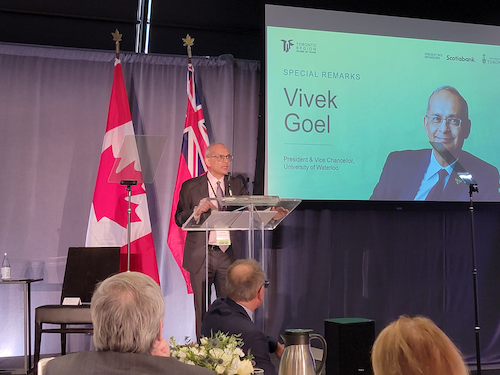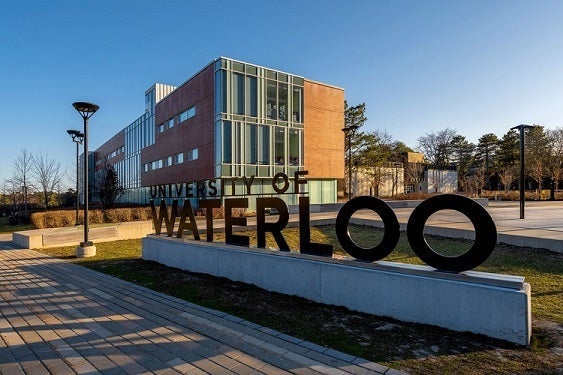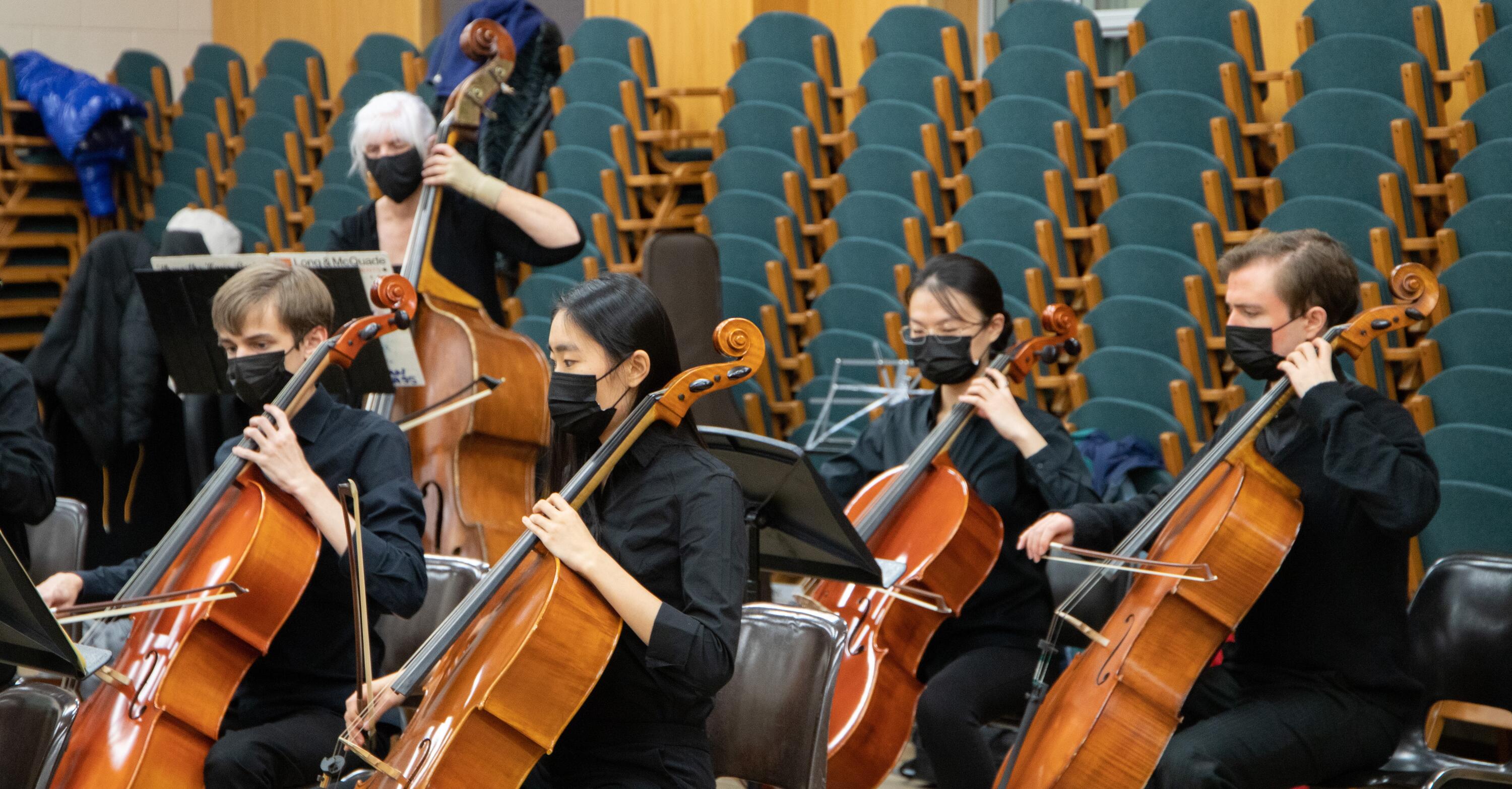- Competing for talent: brain gain or brain drain?
- Land use scientists propose new approaches to addressing global land crises
- A sure sign of spring: the Sunshine List has been announced
- Q and A with the experts: Misinformation, disinformation, and the threat to democracy
- Weekly Nutrition Tip and other notes
Editor:
Brandon Sweet
University Communications
bulletin@uwaterloo.ca
Competing for talent: brain gain or brain drain?

By Sam Charles. This article was originally published on Waterloo News.
The pandemic has forced employers and employees alike to rethink the world of work. Whether the rapid shift to remote work to challenges recruiting top talent, evolving workplace expectations to critical calls for diversity, equity and inclusion – employers and employees are embracing new concepts and approaches.
Speaking at the Toronto Board of Trade’s Workforce Summit 2.0: Closing the Talent Gap, University of Waterloo President Vivek Goel discussed the shared responsibility of the post-secondary education sector and industry to develop the talent that will reshape our local and global post-pandemic recovery. “We clearly have a talent crisis,” explains Goel. “There are three main areas post-secondary education can help in addressing the gaps: producing new talent – our students; reskilling and upskilling existing talent – those working already; and helping bringing new talent into the country – our international students who become immigrants.”
The summit brought together business and thought leaders to get to the root of the transformational challenges facing industry, and unlock solutions that leverage the global talent pool and identify what organizations need to do to win.
A pioneer in co-operative education, Waterloo has a rich history of working alongside industry to building work-integrated learning programs.
Recently, the Business and Higher Education RoundTable suggested that “work-integrated learning remains the gold standard to develop, recruit, and transition new grads into the workplace. Companies are increasingly adopting WIL as part of their recruitment strategies and collaborating with post-secondary education institutions to do so.”
According to Goel, Waterloo’s on-going success in this area is establishing deep engagements with workplaces that have led to research partnerships that provide purpose-driven collaborations.
“We’re using our rich dataset of work term postings to identify the key skills that employers are looking for, to develop our Future Ready Talent Framework.” The framework now informs the institution’s co-op evaluations, work term consultations with employers, professional development courses and career workshops for students.
As a result, Waterloo students graduate much better prepared for the changing nature of work.
Working directly with industry partners, Waterloo launched the WE Accelerate program, a curriculum specifically intended to prepare first-year work term students. The program provides students with a week of synchronous career curriculum, followed by a month of skills development with corporate partners.
“It is crucial for learners to be agile, and be able to transfer skills from industry to another,” Goel told the summit audience. “Not only that, regardless of discipline, university students benefit from broad humanist training that helps them understand how their education relates to broader society.”
While supporting learners throughout their career lifecycle, Goel also pointed to the need for industry to adapt their practices to retain top-talent. “As an institution, Waterloo is working alongside industry to maintain the momentum behind Ontario’s and Canada’s growing innovation ecosystem.”
These complex issues will be investigated at next month’s Waterloo Innovation Summit on April 14.
Land use scientists propose new approaches to addressing global land crises

By Jude Okonkwo. This article was originally featured on Waterloo News.
A recent publication, co-authored by Dawn Parker of the Environment’s School of Planning and Waterloo’s Institute for Complexity and Innovation, reveals 10 facts that help explain the fundamental challenges of achieving sustainability in land use, and point toward solutions.
Published in Proceedings of the National Academy of Sciences of the United States of America, the article applied the expertise of 50 leading land use scientists from 20 countries and highlights key questions whose answers are essential to understand and address land systems pressures.
“With growing human populations and demands on natural resources, land scarcity is increasing,” said Parker. “It is widely acknowledged that land systems are classic examples of complex coupled human-natural systems, and this report distills their complexity into key facts relevant for global environmental management.”
According to the report, numerous factors challenge the sustainability of land systems. One is diverse, conflicting, and contested beliefs and values. The second is the complex nature of land systems, characterized by irreversibility and path dependence. Other facts the report identified are large impacts of land use with small footprints, distant spillovers of local land systems, prevalent trade-offs on lived areas, overlapping and contested claims, unequally distributed benefits, and actors’ mobilization of multiple conflicting visions of justice.
These “10 facts” constitute a set of core principles that can guide scientists, policy makers, and practitioners toward sustainable governance of land use. The researchers also provide six Implications for Land System Governance for Sustainability:
- Just solutions to land challenges acknowledge multiple perceptions, beliefs, and values, the multiple visions of justice, and power differentials.
- Solutions are more successful when they are contextual and adaptive, avoiding silver bullets or “one-size-fits-all” panaceas.
- Governance of land systems is more effective when considering spillovers across spatial and temporal scales.
- Policies and management that prevent undesired, irreversible impacts bring more overall benefits than trying to restore land afterward.
- Land-use decisions that foster synergies are important but need to be combined with mitigating unavoidable trade-offs and managing demand.
- To avoid reinforcing inequalities, governance interventions need to explicitly address inequalities and acknowledge unclear land tenure.
The report advises, "avoiding irreversible negative impacts is always preferable, but beyond this, progressing toward sustainability through land use is often about negotiating fair and acceptable trade-offs and compensations, rather than about achieving optimal outcomes, or stable peace among actors.”
The 10 facts synthesized from land system science (LSS) constitute hard truths that help to define our key challenges, but also provides major opportunities for governing land systems for sustainability.
“These facts do not provide simple answers to current land-related debates on how to manage trade-offs and synergies, how to organize the multifunctionality of land systems across places and scales, and how to set up fair procedures and distribution of land benefits,” said the researchers. “However, they do point to how answers could be developed and provide common ground for science and policy, as well as a research agenda. We hope that acknowledging these facts and their implications can help to build more solid foundations for much-needed conversations on land use and sustainability.”
The report, Ten facts about land systems for sustainability is a Global Land Programme (GLP) research project of Future Earth, an interdisciplinary community of science and practice fostering the study of land systems and the co-design of solutions for global sustainability.
A sure sign of spring: the Sunshine List has been announced

The University of Waterloo has released a list of the 1,856 employees who were paid more than $100,000 in 2021.
Public-sector employers in Ontario are required to publish the list every March since the Public Sector Salary Disclosure Act was passed in 1996. Other universities, school boards, hospitals, colleges, municipalities, and the government itself are now making similar information for last year public.
The $100,000 list includes most of Waterloo's professors, and a number of staff members and senior administrators. It includes people employed by Renison University College, Conrad Grebel University College and St. Paul's University College.
In addition to the salary, a figure is given for taxable benefits received by each individual, for such extras as employer-paid life insurance.
Last year's salary disclosure is also available online.
Q and A with the experts: Misinformation, disinformation, and the threat to democracy

The heavy presence of social media in our lives allows misinformation and disinformation to go unchecked and proliferate. And the resulting online arguments can easily progress to our face-to-face interactions. Rob Danisch is a professor of communication arts at the University of Waterloo. He says there is more at stake than unfriending or uncomfortable family dinners when the points of view we hold and the language we use drive a wedge between us.
What's the difference between misinformation and disinformation?
Misinformation is when we spread or circulate false information, but we're not aware that it's false. Disinformation is when we deliberately mislead people with biased information. So we're intentionally manipulating some narrative or some facts, and we know it's wrong.
How common are they?
Now more than ever, we see the spread of claims and information quickly. That speed means we have very little time to be certain, especially if we're the ones culpable for spreading misinformation. If we don't take the time to verify whether what we're saying is true or false, we can change beliefs much more quickly than we could at any other moment in human history, I think. When people are deliberately misleading other people, the intention is almost always to manufacture conflict.
What's an example of polarizing language?
Recently I've seen this pattern emerge online where there's a refusal to listen to the other side. When you see people opting out of the conversation entirely, you set yourself up for further conflict and that's going to be damaging to the project of collective decision-making. Now, there are worse examples of polarization, but that's a kind of seed that will germinate later on into more intensified patterns of communication that manufacture conflict.
What’s at stake?
In the last 10 or 15 years, there is a pattern of talking to one another that increases polarization, increases conflict, increases fear and anger, and feelings of agitation, anxiety, and uncertainty. If you live in a kind of social democracy, where you have to get along with strangers to make decisions, but you're living in that place with patterns of using language that are manufacturing polarization, conflict, anxiety, or fear, you're going to be very bad at making decisions together. And so the presence of polarizing language prepares the ground for a threat to democracy.
How does this way of communicating threaten democracy?
Democracy is not just a system of government. It does name a system of government, but it's also a way of life. If something's affecting all of us, we have to kind of get along with strangers, and then make a decision together. Good decisions are made when certain kinds of collaborative or constructive relationships with strangers exist, and bad decisions are made when our relationships with strangers are characterized by distrust, anxiety, and fear. If we only have this kind of polarizing language, these patterns of attack, defense, anger, and fear, we're not in a very good position to live democratic lives, to make good decisions with others.
How do we have constructive conversations with people with opposing viewpoints?
Most people don't like being told what to do. Think about what happens when you get pushed. You either fall backward, or you push back. It's fight or flight. We want what I call pull tactics of persuasion that draw someone in, engage them, bring them closer. Ask questions in a non-judgmental, neutral way. And after a few questions, the fight-or-flight response will soften. When our relationships are characterized by trust and mutual understanding, that's when people change their minds.
Rob Danisch, a professor of communication arts at the University of Waterloo, discusses how misinformation and disinformation threaten democracy. Listen to his interview in episode 120 of the Beyond the Bulletin podcast to learn more.
Weekly Nutrition Tip and other notes
This Week’s Nutrition Month Tip: Food security is a vital component of a sustainable food system. Advocating for increased access to nutritious food and poverty reduction initiatives is one way we can work towards food security in our communities. Start by increasing your awareness of food insecurity in Canada, talking about it and working collectively to support the positive initiatives that exist in our community. Consider learning more about and supporting the WUSA Food Support Service on Campus or Region of Waterloo Food Bank as a first step.
And with that, our series of weekly Nutrition Month Tips has come to a close. Many thanks are due to Nicole Pin, Registered Dietitian with UW Food Services, who shared this series of fun tips to help you create “ingredients for a healthier tomorrow” for Nutrition Month.

The orchestra@UWaterloo End of Term Concert is scheduled to take place at 7:00 p.m. tonight and will be the ensemble's first in-person concert with a live audience in two years. Members are from all six faculties, and this term features strings, woodwinds, brass, and percussion. The concert has free admission, but all audience members must be fully vaccinated and masked as per University of Waterloo policies. Tickets are required for entry. Please email music@uwaterloo.ca if you would like some tickets reserved.
"The Library has put together a thorough list of book titles in our online catalogue to provide those interested with political, historical, social, economic and biographical background information related to the current Russian invasion of Ukraine," says a note from the University of Waterloo Library. The interactive list has been shared this week through the Library's social media platforms.
"The University of Waterloo Staff Association has been polling the campus community to understand how the pandemic has impacted our working conditions," the UWSA reports. "This is the third such survey, and we’ve added a few questions to dig a bit deeper into the results shared by the University from its COVID-19 employee survey. This concise survey will assist us in understanding what is working well for staff and what challenges you are facing while looking ahead at the future of our work."
"We’ll use the anonymous responses to guide our conversations with UWaterloo administration on your behalf," says UWSA. "Because UWSA represents the interests of all UWaterloo support staff, you don’t have to be a UWSA member to complete the survey. The survey asks just 11 brief questions and will close at 11:59 p.m. on April 6, 2022. Your responses are anonymous and cannot be tied to your identity. Please complete the COVID Campus Climate Survey #3 today. We thank you in advance for filling out the survey and ask that you please send it to other UWaterloo staff members."
Employers hosting Virtual Employer Information Sessions (VEIS) this week include Jane Street. Make sure to register WaterlooWorks and check the calendar for any updates.
Link of the day
When and Where to get support
Students can visit the Student Success Office online for supports including academic development, international student resources, immigration consulting, leadership development, exchange and study abroad, and opportunities to get involved.
Instructors looking for targeted support for developing online components for blended learning courses, transitioning remote to fully online courses, revising current online courses, and more please visit Agile Development | Centre for Extended Learning | University of Waterloo (uwaterloo.ca).
Instructors can visit the Keep Learning website to get support on adapting their teaching and learning plans for an online environment.
Course templates are available within your course in LEARN to help you build and edit your content and assignment pages quickly.
The following workshops, webinars, and events are offered by the KL team (CTE, CEL, ITMS, LIB):
- Independent Remote Course Design Essentials, self-directed, continuous self-enrollment course in LEARN.
- Independent Blended Course Design (iBlend), self-directed, ongoing
- Copyright Overview for Waterloo Instructors and Staff - self-directed, continuous self-enrollment course in LEARN.
- Integrating PebblePad Retreat (IPR) - Setting up your Spring PebblePad Assignments and Activities (CTE7531), Monday, April 4, 1:00 p.m. to 4:00 p.m.
Supports are available for employees returning to campus. Visit IST’s Hybrid Work and Technology guidelines and workplace protocols to assist with the transition.
The Writing and Communication Centre has virtual services and programs to help undergrads, grad students, postdocs and faculty members with academic writing.
- Meet with writing advisors in one-to-one appointments to brainstorm, draft, revise, and polish. No time for an appointment? Try email tutoring for undergrads.
- Beat isolation and make writing progress at weekly Virtual Writing Cafés for grad students and faculty or PJ-Friendly Writing Groups for Undergrads.
- Take an online workshop or apply to our popular Dissertation Boot Camp program.
- Faculty can request custom in-class workshops for their courses, or the WCC can facilitate any existing workshops for student groups.
- Course-integrated support available. Attention faculty and instructors: The application form for Writing and Communication Centre course-integrated support is now available online. We offer five unique support streams for your courses including synchronous and asynchronous workshops and monitored discussion boards.
Co-op students can get help finding a job and find supports to successfully work remotely, develop new skills, access wellness and career information, and contact a co-op or career advisor.
The Centre for Career Action (CCA) has virtual services and programs to support undergrads, grad students, postdocs, alumni and employees in figuring out what they value, what they’re good at, and how to access meaningful work, co-op, volunteer, or graduate/professional school opportunities. Questions about CCA's services? Live chat, call 519-888-4047, or stop by our front desk in the Tatham Centre between 8:30 a.m. and 4:30 p.m. EST, Monday to Friday.
Drop-in to Warrior Virtual Study Halls on Wednesdays from 5:30 p.m. to 7:00 p.m. Come together in this virtual space to set goals and work independently or in groups each week.
Renison's English Language Institute continues to offer virtual events and workshops to help students practice their English language skills.
If you feel overwhelmed or anxious and need to talk to somebody, please contact the University’s Campus Wellness services, either Health Services or Counselling Services. You can also contact the University's Centre for Mental Health Research and Treatment. Good2Talk is a post-secondary student helpline available to all students.
The Library is open with expanded hours for access to book stacks, drop-in individual study space, bookable group study rooms, drop-in access to computers and printers, book pick-up services and IST Help Desk support. Librarian consultations, Special Collections & Archives and the Geospatial Centre are available by appointment. Full details on current services and hours are available on the Library’s COVID-19 Update webpage.
The Faculty Association of the University of Waterloo (FAUW) continues to advocate for its members. Check out the FAUW blog for more information.
The University of Waterloo Staff Association (UWSA) continues to advocate for its members. Check out the UWSA blog for more information.
The Sexual Violence Prevention and Response Office (SVPRO) supports all members of the University of Waterloo campus community who have experienced, or been impacted, by sexual violence. This includes all students, staff, faculty and visitors on the main campus, the satellite campuses, and at the affiliated and federated Waterloo Institutes and Colleges. For support, email: svpro@uwaterloo.ca or visit the SVPRO website.
The Office of Indigenous Relations is a central hub that provides guidance, support, and resources to all Indigenous and non-Indigenous campus community members and oversees the University's Indigenization strategy.
The Waterloo Indigenous Student Centre, based at St. Paul’s University College, provides support and resources for Indigenous students, and educational outreach programs for the broader community, including lectures, and events.
WUSA supports for students:
Peer support - MATES, Glow Centre, RAISE, Women’s Centre - Visit https://wusa.ca/peersupport to book an appointment either in person or online for the Fall term.
Food Support Service food hampers are currently available from the Turnkey Desk 24/7 in the Student Life Centre. Drop off locations are also open again in SLC, DC, DP, SCH and all residences.
Co-op Connection all available online. Check https://wusa.ca for more details.
Centre for Academic Policy Support - CAPS is here to assist Waterloo undergraduates throughout their experience in navigating academic policy in the instances of filing petitions, grievances and appeals. Please contact them at caps@wusa.ca. More information is available.
WUSA Student Legal Protection Program- Seeking legal counsel can be intimidating, especially if it’s your first time facing a legal issue. The legal assistance helpline provides quick access to legal advice in any area of law, including criminal. Just call 1-833-202-4571.
Empower Me is a confidential mental health and wellness service that connects students with qualified counsellors 24/7. They can be reached at 1-833-628-5589.
GSA-UW supports for graduate students:
The Graduate Student Association (GSA-UW) supports students’ academic and social experience and promotes their well-being.
Advising and Support - The GSA advises graduate students experiencing challenges and can help with navigating university policies & filing a grievance, appeal, or petition.
Mental Health covered by the Health Plan - The GSA Health Plan now has an 80 per cent coverage rate (up to $800/year) for Mental Health Practitioners. Your plan includes coverage for psychologists, registered social workers, psychotherapists, and clinical counselors.
Dental Care - The GSA Dental Plan covers 60 to 70 per cent of your dental costs and by visiting dental professionals who are members of the Studentcare Networks, you can receive an additional 20 to 30 per cent coverage.
Student Legal Protection Program - Your GSA fees give you access to unlimited legal advice, accessible via a toll-free helpline: +1-833-202-4571. This advice covers topics including housing disputes, employment disputes, and disputes with an academic institution.
The Graduate House: Open Monday to Friday 11:30 a.m. to 6:00 p.m. We’re open to all students, faculty, staff, and community members. The Graduate House is a community space run by the GSA-UW. Vaccination Records and Government ID continue to be required for all dine-in guests. Graduate students who paid their fees can get discounts and free coffee.
When and Where (but mostly when)
Warriors vs. Laurier Blood Donation Battle. Join our “Waterloo Warriors” team on the Blood.ca website or app. #ItsInYouToGive
Half Price Fitness Memberships and Rock Climbing Memberships. Only $25 for the remainder of the term. Purchase your membership now.
Warriors truLOCAL Kickback Program, March 22 to April 22. Purchase high quality locally sourced meat and fish while supporting your favourite Waterloo Warriors varsity team. Find out more.
Master of Taxation, Virtual Information Session, part-time info session, Thursday March 31, 1:00 p.m., full-time info session, Thursday March 31, 2:00 p.m. To register visit, www.mtax.ca.
PJ-Friendly Writing Groups for Undergrads, Thursday, March 31, 2:00 p.m.
Indigenous Speakers Series presents Lenore Keeshig, Thursday, March 31, 4:00 p.m.
Concept $5k Finals, Thursday, March 31, 5:00 p.m.
UW OER Fellows Grant Program submission deadline, Friday, April 1.
Global Engagement 2022 Desmarais Family Summit: Water in the World, Monday, April 4, 6:00 p.m.
NEW - Lectures and classes end, Tuesday, April 5.
NEW - Wicked Problems: The Ethics of Action for Peace, Rights, and Justice Book Talk, Tuesday, April 5, 6:30 p.m.
NEW - Pre-exam study days, Wednesday, April 6 and Thursday, April 7.
Positions available
On this week's list from the human resources department, viewable on the UWaterloo Talent Acquisition System (iCIMS):
- Job ID#2021-6599 - Manager, Mechanical Engineering - Plant Operations, USG 14
- Job ID# 2022-8127 - Systems Administrator - Waterloo Undergraduate Students Association, USG 7
- Job ID# 2022-8202 - Faculty Relations Manager - Student Success Office, USG 10
- Job ID# 2022-8209 - Communications Design Specialist - Print + Retail Solutions, USG 6
- Job ID# 2022-8224 - Student Services Manager - Math Undergrad Office, USG 9
- Job ID# 2022-8187 - Instructional Support Coordinator - EDGE Program - CEE - WIL Programs, USG 9
- Job ID# 2022-8117 - Manager, Finance and Operations – WatSPEED, USG 9
- Job ID# 2022-8171 - Financial Aid Team Lead - Office of the Registrar, USG 7
- Job ID# 2022-8172 - Financial Aid Specialist - Office of the Registrar, USG 6
- Job ID# 2022-8199 - ITC Survey Management Associate – Psychology, USG 6
- Job ID# 2022-8200 - Administrative Manager - Communication Arts, USG 7
- Job ID# 2022-8245 - Head, Information Services and Resources – Library, USG 14
- Job ID# 2022-8219 - Building Operator II - Plant Operations, CUPE
- Job ID# 2022-8234 - Research Information Technologies Specialist - Vice President Research & International, USG 10
- Job ID# 2022-8182 - Accounts Payable & Inventory Assistant - Food Services, USG 4
- Job ID# 2022-8184 - Area Manager, Operations - Food Services, USG 9 – 10
- Job ID# 2022-8227 - Development Coordinator - Office of Advancement, USG 6
- Job ID# 2022-8230 - Food Services Support Person - Food Services, CUPE
- Job ID# 2022-8231 - Kitchen Porter - Food Services, CUPE
- Job ID# 2022-8232 - Food Services Assistant - Food Services, CUPE
- Job ID# 2022-8233 - Assistant Stores Handler - Food Services, CUPE
- Job ID# 2022-8917 - Client Service Representative - Campus Wellness, USG 4
Secondments/Internal temporary opportunities
- Job ID# 2022-8204 - Energy Materials - Administrative Assistant – Chemistry, USG 5
- Job ID# 2022-7900 - Library Systems Analyst – Library, USG 9
- Job ID# 2022-8169 - Administrative Manager, Arts Undergraduate Office - Arts Undergraduate Office, USG 8
- Job ID# 2022-8176 - Digital Scholarship Librarian – Library, USG 10 – 13
- Job ID# 2022-8206 - Program Manager, Computing & Financial Management - School of Accounting and Finance, USG 8
- Job ID# 2022-8220 - Weekend and Evening Supervisor – Library, USG 5
- Job ID# 2022-8236 - Program Intake Manager - Centre for Extended Learning, USG 10
- Job ID# 2022-8183 - Undergraduate Coordinator and Administrative Assistant, Architectural Engineering - Civil & Environmental Engineering, USG 6
- Job ID# 2022-8178 - Marketing & Customer Service Assistant - Food Services, USG 4
- Job ID# 2022-8211 - Assistant Supervisor - Food Services, USG 5
- Job ID# 2022-8244 - Advancement Coordinator - Dean's Office, Faculty of Health, USG 6
Affiliated and Federated Institutions of Waterloo opportunities